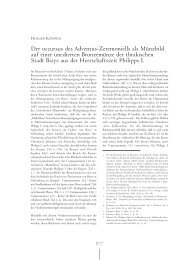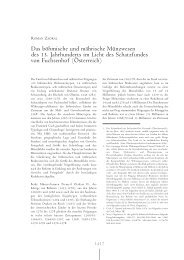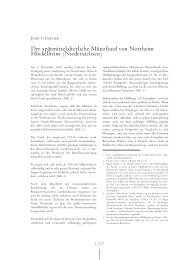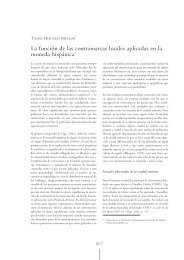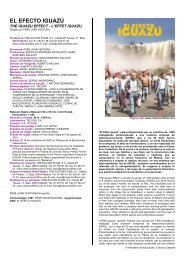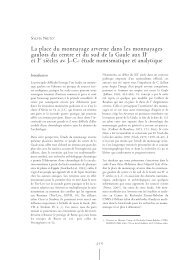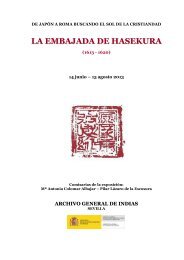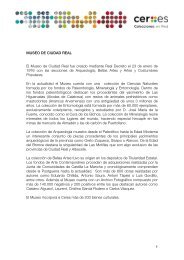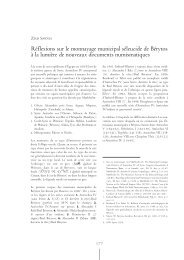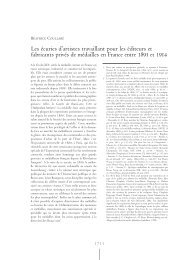La Ley de Memoria Histórica: reparación e insatisfacción Julio ...
La Ley de Memoria Histórica: reparación e insatisfacción Julio ...
La Ley de Memoria Histórica: reparación e insatisfacción Julio ...
You also want an ePaper? Increase the reach of your titles
YUMPU automatically turns print PDFs into web optimized ePapers that Google loves.
comunicación, al mundo académico relacionado con la Historia y las ciencias sociales y a colectivos ciudadanos<br />
interesados y activos. Y en este terreno está muy presente la aprensión <strong>de</strong> que los “movimientos<br />
por la memoria” interfieran y dificulten la tarea <strong>de</strong> elaborar una Historia verda<strong>de</strong>ramente profesional,<br />
informada, veraz e in<strong>de</strong>pendiente, <strong>de</strong> nuestros recientes conflictos. Y esa aprensión es perfectamente<br />
explicable.<br />
Al fin, tras un recorrido proceloso en muchos aspectos, la <strong>Ley</strong> 52/2007, <strong>de</strong> 26 <strong>de</strong> diciembre, ha expresado<br />
en un texto <strong>de</strong> alto rango un difícil equilibrio <strong>de</strong> propuestas <strong>de</strong> fondo y medios instrumentales para una<br />
<strong>reparación</strong>, que nadie honradamente pue<strong>de</strong> discutir pero que la realidad muestra que ha producido grados<br />
y formas <strong>de</strong> la <strong>insatisfacción</strong> que permanecen en pie. <strong>La</strong>s <strong>de</strong>rechas sociológicas y políticas españolas, e<br />
instituciones como la Iglesia Católica, han mantenido su oposición frontal. Los sectores progresistas, un<br />
amplio espectro <strong>de</strong> las personas afectadas familiar e i<strong>de</strong>ológicamente por el contenido <strong>de</strong> la <strong>Ley</strong>, han<br />
mantenido igualmente sus reticencias.<br />
Cabe ahora, pues, expuestos estos extremos, intentar expresar unos comentarios y unas explicaciones<br />
acerca <strong>de</strong> la justicia o no <strong>de</strong> esa <strong>insatisfacción</strong>, <strong>de</strong>l alcance mismo <strong>de</strong> la <strong>Ley</strong> y <strong>de</strong> lo que pue<strong>de</strong> esperarse<br />
<strong>de</strong> sus objetivos y los medios puestos en acción para conseguirlos. Y cabe expresar una impresión primera<br />
en cuanto a las perspectivas que la disposición plantea y las posibilida<strong>de</strong>s <strong>de</strong> su cumplimiento. <strong>La</strong><br />
“<strong>Ley</strong> <strong>de</strong> <strong>Memoria</strong> <strong>Histórica</strong>” es una disposición tardía, sin duda, incompleta en ciertos aspectos, tal vez<br />
utópica en otros, pero que aborda con entera justicia la satisfacción <strong>de</strong> una <strong>de</strong>uda colectiva que nunca<br />
fue encarada con la generalidad con la que lo es ahora.<br />
<strong>La</strong> <strong>Ley</strong> ha sido promulgada en un momento histórico, al comenzar el nuevo siglo, cuyas características<br />
explican suficientemente su propia aparición. Así, si bien su Preámbulo, <strong>de</strong> gran interés, se reclama <strong>de</strong>l<br />
espíritu reconciliador <strong>de</strong> la Transición a la <strong>de</strong>mocracia como inspiración y fundamento <strong>de</strong> sus disposiciones,<br />
no es menos cierto que su contenido y el momento en que aparece nos muestran, más bien, que<br />
las carencias <strong>de</strong>nunciadas se relacionan por todos los críticos con la forma en que los protagonistas <strong>de</strong><br />
esa Transición abordaron la re-consi<strong>de</strong>ración <strong>de</strong>l pasado que había llevado a una larga Dictadura tras una<br />
guerra civil producto <strong>de</strong> un alzamiento ilegítimo, como ha sido reconocido por una <strong>de</strong>claración parlamentaria<br />
<strong>de</strong> 2002.<br />
of a full reparation of the memory of the <strong>de</strong>feated. From<br />
this realm has even arisen documents such as the<br />
“Barcelona Manifesto” from November 2006, in which a<br />
broad spectrum of institutions of different sorts asked<br />
for the categorical removal of the project sponsored by<br />
the Government. This position moves on the axis of the<br />
<strong>de</strong>mand for an explicit <strong>de</strong>claration of invalidity of all the<br />
processes and the corresponding sentences dictated by<br />
the civil and military courts that the rebels erected and<br />
which the Dictatorship maintained during two <strong>de</strong>ca<strong>de</strong>s<br />
to judge the supposed political crimes committed by<br />
those who <strong>de</strong>fen<strong>de</strong>d the Republican legality. The generic<br />
position of the left is, therefore, that the document set<br />
into motion is clearly insufficient as a reparative instrument<br />
and didn’t fulfill its intentions.<br />
Even so, these two truly irreconcilable positions don’t<br />
make up the sum total of the spectrum of total or partial<br />
disagreements that were expressed in reaction to<br />
the possibility of the passage of a <strong>La</strong>w of this type. There<br />
was an important current of civic opinion, as well as<br />
from experts and scholars, who, recognizing in principle<br />
the need of a <strong>de</strong>finitive reparatory action, were split in<br />
the forms of its expressions and the applicable instruments<br />
to un<strong>de</strong>rtake it. The <strong>de</strong>claration of invalidity of<br />
the Courts and sentences ma<strong>de</strong> by the rebels and the<br />
Dictatorship divi<strong>de</strong>d the judges, certainly along the line<br />
that separates conservatives and progressives. The spe-<br />
cific forms in which the Collective Memory (or better yet,<br />
“the memories”) should take charge of this socially<br />
urgent need and to proceed to the due rectifications is<br />
also the source of found criteria. But it is that, for the<br />
rest, the need and the possibility that the Memory itself<br />
could be based and rectified precisely with a disposition<br />
with the range of a <strong>La</strong>w divi<strong>de</strong>d politicians, intellectuals,<br />
magistrates and the media, to the aca<strong>de</strong>mic world related<br />
to History and the social sciences and the active and<br />
implicated civic collectives. And in this field, the apprehension<br />
that the “movements for the memory” interfere<br />
and make difficult the work of elaborating a truly professional,<br />
informed, faithful, and in<strong>de</strong>pen<strong>de</strong>nt History of<br />
our recent conflicts is very present. And this apprehension<br />
is perfectly explainable.<br />
After a stormy journey in many aspects, <strong>La</strong>w 52/2007 of<br />
December 26, has finally expressed in a text of wi<strong>de</strong><br />
scope a difficult equilibrium of fundamental proposals<br />
and instrumental media for a reparation which no one<br />
honorably could dispute but which reality shows has produced<br />
<strong>de</strong>grees and forms of dissatisfaction which remain<br />
active. The Spanish sociological and political right, institutions<br />
such as the Catholic Church, have maintained<br />
their head-on opposition. The progressive sectors, a wi<strong>de</strong><br />
spectrum of the people affected through family and i<strong>de</strong>ologically<br />
by the contents of the <strong>La</strong>w, have likewise maintained<br />
their reticence.<br />
51



